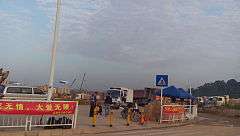2015 Shenzhen landslide
 Site of landslide as of 25 December 2015 from a distance | |
| Time | 11:40 am CST |
|---|---|
| Date | 20 December 2015 |
| Location | Guangming New District, Shenzhen, Guangdong, China |
| Coordinates | 22°43′05″N 113°55′55″E / 22.71806°N 113.93194°ECoordinates: 22°43′05″N 113°55′55″E / 22.71806°N 113.93194°E |
| Casualties | |
| 69 deaths,[1] 8 missing[1] and 16 injured[2][3] | |
 Shenzhen landslide | |
A landslide of construction waste occurred at Shenzhen, China, on 20 December 2015. It destroyed and buried industrial buildings and worker living quarters in the nearby industrial park. The death toll was 69 with 8 persons reported missing. It was an industrial accident due to human negligence rather than a natural disaster. The local police had arrested some of the people involved in the irregularities of the huge waste dump which was built up in previous two years.[4][5]
Background
It has been reported that waste material generated from construction work elsewhere had been piled up in a former quarry over the past couple of years.[6][7] The adjacent natural hill did not slide, according to a geological report issued by the Ministry of Land and Resources on 21 December 2015.[7]
Landslide
On 20 December 2015 at 11:40 am a pile of construction waste, stored on a hillside, slid down in an avalanche of mud and debris, destroying 33 buildings and covering an area greater than ten hectares (25 acres) in the Hengtaiyu Industrial Park (恒泰裕工业园), which is, administratively, under Guangming New District of Shenzhen.[8]
The landslide reportedly ruptured a nearby 400-metre (1,300 ft) section of the West–East Gas Pipeline and triggered an explosion which was heard about 4 kilometres (2.5 mi) away.[9][10] According to The New York Times, PetroChina stated that this was untrue,[7] although Reuters subsequently reported that PetroChina announced its plan to lay a temporary gas pipeline to replace the damaged one.[11]
According to the Ministry of Land and Resources, the landslide occurred after a 20-storey-high mountain of dumped earth and construction waste collapsed.[12]
Emergency response
Chinese authorities had over 2,906 rescue personnel, including about 800 from the defence forces, excavating dirt and rubble at the Hengtaiyu industrial park.[13]
More than 1,500 emergency rescuers were involved in the search for people trapped under the mud; as of 21 December, seven people had been rescued, and 76 people were still missing.[14] Approximately 900 people have been evacuated from the area.[14]
Evacuees were billeted at a nearby sports centre.[7]
Responses
Communist party General Secretary Xi Jinping and Premier Li Keqiang called for all-out rescue efforts.[15] Also, Ma Xingrui, the Communist Party Secretary of Shenzhen, rushed back from Beijing to Shenzhen during The Central Economic Work Conference after hearing of this landslide.[16]
The United Nations Secretary-General Ban Ki-moon extended his condolences to the families of the victims of the landslide.[17]
On 25 December, Ma Xingrui, along with other city officials, issued a public apology to Shenzhen citizens.[18]
On 27 December, the official who approved the construction of the waste dump that triggered the landslide, identified as the former director of Shenzhen Guangming New District Urban Management Bureau Xu Yuan'an (徐远安), jumped off a building in Nanshan District in an apparent suicide.[19]
Mourning
On 26 December, rescuers and officials mourned those who died in the landslide. The ritual was held seven days after the landslide, in line with the Chinese tradition. The mourners scattered white flowers on the debris.[20]
References
- 1 2 "China confirms 58 killed in Shenzhen landslide". 6 January 2016.
- ↑ "深圳山体滑坡挖出第一具遇难者遗体 现场五六处生命迹象". 网易新闻. 22 December 2015.
- ↑ "深圳山体滑坡灾害:入院救治伤员增至16人". 中国新闻网. 21 December 2015.
- ↑ "Shenzhen officer linked to landslide kills himself". rthk. 28 December 2015.
- ↑ "China Authorities Arrest 11 People Over Shenzhen Landslide". WSJ. 1 January 2016. Retrieved 2 January 2016.
- ↑ "China landslide: Many missing after buildings collapse in Shenzhen". BBC. 20 December 2015. Retrieved 21 December 2015.
- 1 2 3 4 Buckley, Chris; Ramzy, Austin (21 December 2015). "Shenzhen, Embodying China's Growth, Falls Risk to It". The New York Times.
- ↑ Zeng, Vivienne (21 December 2015). "Man-made disaster: 91 missing in Shenzhen following construction waste landslide". Hong Kong Free Press.
- ↑ "China landslide sparks gas explosion and leaves dozens missing". The Guardian. 20 December 2015.
- ↑ "China landslide leaves 27 missing, sparks gas explosion: Xinhua". Hong Kong Free Press. AFP. 20 December 2015.
- ↑ "PetroChina to build temporary gas pipe in 10 days after blast". Reuters. 21 December 2015.
- ↑ He Huifeng; Zhuang Pinghui; Mimi Lau (22 December 2015). "Shenzhen landslide: 76 missing, only one body found so far, authorities say". South China Morning Post.
- ↑ "Reinforcements join Shenzhen landslide rescue". Xinhua. Retrieved 22 December 2015.
- 1 2 "China landslide: Rescuers search for 85 people still missing". BBC. 21 December 2015. Retrieved 21 December 2015.
- ↑ "Shenzhen landslide disaster shows urbanisation must go hand in hand with good governance". South China Morning Post. Retrieved 22 December 2015.
- ↑ "China's former top scientist-turned-city party boss rushes back to Shenzhen after landslide". South China Morning Post. Retrieved 22 December 2015.
- ↑ "Ban extends condolences to people, Government of China in wake of devastating landslide". United Nations News Centre. Retrieved 22 December 2015.
- ↑ "Shenzhen Landslide Man-made Event, Not Natural Disaster". China Radio International. Retrieved 26 December 2015.
- ↑ "Shenzhen landslide aftermath: Official who rubber-stamped waste dump that triggered disaster takes his own life". South China Morning Post. 28 December 2015.
- ↑ "Rescue team mourn victims of Shenzhen landslide". Xinhua. Retrieved 26 December 2015.